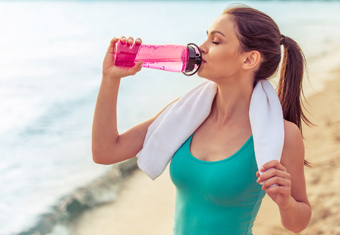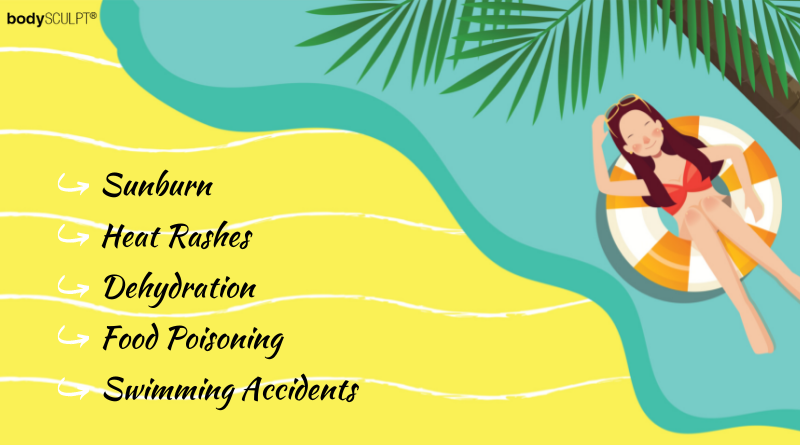
Common Health Hazards and Protective Measures
Here are five common summer health hazards and the precautions you should take to avoid them:
- Sunburn: Overexposure to the sun can cause the skin to burns, turn red and become irritated. Both UVA and UVB rays cause skin damage, and prolonged exposure to UV rays can cause skin cancer. To avoid sunburn, stay in the shade or avoid the sun’s rays in the peak hours – 11 am to 4 pm. If you are exposed to the sun, wear sunscreen and a wide brimmed hat. If you happen to get sunburn, take a cool shower immediately and apply a cool compressor or aloe vera gel to soothe the skin. If there are other symptoms like facial swelling, nausea, fever or chills, rapid pulse, rapid breathing, dizziness or signs of skin infection, get immediate medical help.
- Food poisoning: The other health ailment commonly seen in summer is food borne illness. This season is the time for outdoor cooking and dining, and if not properly handled, this is a perfect environment for bacteria to grow fast. Bacteria can form easily if unrefrigerated foods such as mayonnaise, dairy, eggs or meat are exposed to high temperatures. To avoid food poisoning, follow the advice of the U.S. Department of Agriculture on cleaning, separating, cooking and chilling. Mild cases of poisoning can be cured at home, but if still symptoms persist, seek medical help.
- Swimmer’s ear: Swimmer’s ear is infection caused when water enters the ear canal and gets trapped by excess ear wax. It can temporarily reduce hearing, and in serious cases, cause inflammation and swelling. Stay away from dirty water and dry your ears thoroughly after swimming.
- Fireworks injuries: Every summer, fireworks cause significant eye and hand injuries. The safest way to watch fireworks is at a professionally sponsored display. If you decide to use permitted novelty items or sparklers, take the necessary precautions: keep a fire extinguisher handy, keep children away from the fireworks and do not give them sparklers because they can explode in the hand. In case of a firework burn, apply cool (not cold) water by running water over the burn at least 5 minutes, soaking it in a water bath, or applying a clean, wet towel. Get to a medical center for treatment.
- Dehydration: It’s easy to get dehydrated in summer if you don’t drink enough water. Drink at least 8 glasses of water and carry a water bottle with you all the time. If you become mildly dehydrated, get out of direct sunlight and lie down in a cool spot, rest and drink plenty of fluids. Watch out for heat stroke as it is the most serious form of heat injury and considered a medical emergency.
Find out more about summertime health hazards and take precautions before they affect you. This will help you stay safe while enjoying the outdoors.
